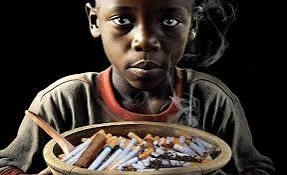Following the global agreements at the conclusion of World Conference on Tobacco Control and the industry’s insistence on recruiting young users of tobacco products to replace the dying smokers, there is the need for Africa to strategize on local actions to save its youths from being decimated by the lethal products being unleashed on the young population of the continent
By Edu Abade
African is set to combat the giant tobacco industry promoters of unhealthy products like cigarettes, Shisha, vape, e-cigarettes and other sweetened offerings, especially for impressionable school children, teenagers and young adults on the stable of Philip Morris International (PMI), British American Tobacco (BAT) Japan Tobacco International (JTI) and other global players in the industry.
African tobacco control advocates, who held a Webinar to review resolutions reached at the just concluded World Conference on Tobacco Control (WCTC) formerly known as the World Conference on Tobacco or Health (WCTOH), maintained that policy makers, good spirited individuals, groups and organizations must do everything possible in their different ways to salvage the African youth from the pangs of tobacco industry addiction.
The WCTC is a leading global event for tobacco control, organized by The Union with support from Bloomberg Philanthropies. The next conference will be held in Dublin, Ireland from June 23-25, 2025. This in-person event gathered academics, health professionals, Non-Governmental Organizations (NGOs) and policymakers from over 100 countries from around the world.
The conference served as a vital platform for sharing successes, best practices and strengthening efforts to counter the tobacco industry and also played a key role in shaping the technical and civil society contributions to major global negotiations scheduled for later part of 2025, such as the Fourth International Conference on Financing for Development.
Key topics at the conference included health taxes, which discussed the potential of tobacco taxes to reduce consumption, generate revenue, and improve public health and policy interventions where participants shared strategies for implementing effective tobacco control policies, including smoke-free laws and restrictions on advertising.
Other thematic area included countering the tobacco industry by examining tactics used by the tobacco industry and developing strategies to mitigate their influence, as well as tackling Non-Communicable Diseases (NCDs) by addressing the role of tobacco in the broader context of NCDs and exploring comprehensive approaches. The conference also highlighted the importance of youth involvement and the need for bold and swift action in tobacco control.
Speaking at a Webinar organized by the Renevlyn Development Initiative (RDI) for African tobacco control advocates and journalists with the theme: From Global Agreement to Local Action, Executive Director of RDI, Philip Jakpor, stressed that to effectively combat NCDs and the millions of deaths associated with consumption of tobacco products, there was the need to rescue African youths from the grip of tobacco industry lies, distractions and addiction tactics before it was too late.
“The World Conference on Tobacco Control (WCTC) has come and gone but then a lot happened and unlike previous conferences, we had a large population of youth delegates from different countries, especially from the Global South. So, this convergence is to look at the issues again, the lessons we have learnt to ensure how the youths can better prepare for future conferences and how the tobacco industry is targeting the youth as replacement smokers for the dying population of old smokers and users of their products and how best to sustain their products and markets, especially in Africa,” he stated.
Also speaking on the impact of the WCTC, a South African tobacco control advocate, Elvira Majiwa, explained that the most impactful aspect of the conference was that it inspired younger African control advocates to continue working in the tobacco control space, especially on the state of the art section, which she noted will impact them in the next 20 years, adding that their session with the Director-General of the World Health Organization (WHO), remained quite impactful.
Speaking, President of the Bangladesh Students Society (BSS), Dr Sakib I, said from 2023, the BSS work with the Youth Initiative on Tobacco Control (YITC), revealed what world leaders and Bangladesh authorities were doing in tobacco control.
He maintained that reflections from the WCTC indicated that medical students and doctors should be the agents of change, adding that no fewer than 5,000 medical students from 15 medical colleges were involved in the programme.
On his part, Matthew Naveen Smiwinga from Zambia affirmed that youths were adequately represented from various countries and organizations in enacting tobacco control tactics and plans during and after the conference, but Zachary Borromeo, who uses art and cartoons to portray tobacco control issues, lamented that strong ties with the Tobacco Industry in the Philippines was impeding tobacco control efforts in that country and that some barely mature youths were sighted at the WCTC.
In their final words, Elvina, Naveen and Zachary affirmed that no fewer than 300 young persons, representing youth committees from different countries participated in the conference, to plan different sessions, maintaining that the resolutions at the Webinar pointed the right direction for cross country learning and continental collaboration to continue the partnership, cross learning and graphical warnings on tobacco control issues.




